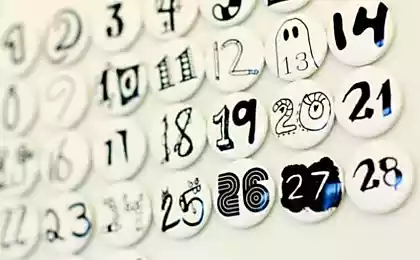777
How did the seven-day week
Have you ever wondered why in a week seven days? Not five, not nine, namely seven? It turns out, the man began to think about it and to experiment in this area thousands of years ago. The time units of this type, ie combining several days days in a row, in different nations have existed since ancient times. For example, the Romans were the expense of days "vosmidnevkami" - the trading week, which have been working seven days, and the eighth - bazaar.
Apparently, the custom measure time seven-day week came to us from ancient Babylon and is associated with changes in the phases of the moon. People saw the moon in the sky for about 28 days, seven days - up to the first quarter, about the same amount - before the full moon, etc.
At one time, the ancient Babylonian astronomers discovered that the sky is "wandering" of light called planets. It was assumed that these luminaries revolve around the earth in this order: Moon, Mercury, Venus, Sun, Mars, Jupiter and Saturn. Every hour of the day was at the ancient Babylonian astrologers under the auspices of a certain planet.
Account was launched on Saturday, the first hour of its "managed" Saturn (next to the clock - in the reverse order of the planets). As a result, the first hour of Sunday, ruled by the Sun, the first hour of the third day (Monday) - The Moon, the fourth - Mars, the fifth - Mercury, the sixth - Jupiter, the seventh (Friday) - Venus. Accordingly, these titles and were the days of the week.
These days of the week the names of gods, moved to the Romans, and then in the calendars of many nations of Western Europe. "Discrepancies" in English due to the fact that the names Tuesday, Wednesday, Thursday and Friday, the British took from Norse mythology, in which Tiu - god similar to Mars Water - Mercury, Thor - Jupiter and Freya - Venus. Name of the planet used to indicate days of the week and many Asian peoples - Indians, Mongols, Koreans, Thais.
In many languages, several days a week (and sometimes all) are numbered. But not everywhere the first day of the week - Monday. The Babylonians suffered on Saturday at the end of the week, as Saturn was considered an unlucky day. On this day it was ordered not to engage in any business, and he was called "the Sabbath" - peace. This name is passed in some languages, for example, Jewish and Arab.
Numbered several days a week and in the Slavic languages, but the account is carried out "after Sunday." The decision to celebrate Sunday took more Roman Emperor Constantine in 321 Sometime Sunday Slavic peoples was called a week (the day when the rest of the cases, do not do anything). This name is preserved in all Slavic languages other than Russian. In the Russian language Monday - a (first) day after a week, Tuesday - the second, etc. And the environment - really average day.
In the Soviet Union used the 5- and 6-day week. In 1929-30. week was a 5-day, every employee had unfixed one output. September 1, 1931 it was replaced by a 6-day week with a fixed day of rest. The usual 7-day week was introduced June 26, 1940.
Perhaps a week of seven days - this is the optimal combination of work and rest, tension and idleness. Be that as it may, we still live accounts on one or another, but routine. So let your routine will be more paid holidays. Take care of yourself!
Apparently, the custom measure time seven-day week came to us from ancient Babylon and is associated with changes in the phases of the moon. People saw the moon in the sky for about 28 days, seven days - up to the first quarter, about the same amount - before the full moon, etc.
At one time, the ancient Babylonian astronomers discovered that the sky is "wandering" of light called planets. It was assumed that these luminaries revolve around the earth in this order: Moon, Mercury, Venus, Sun, Mars, Jupiter and Saturn. Every hour of the day was at the ancient Babylonian astrologers under the auspices of a certain planet.
Account was launched on Saturday, the first hour of its "managed" Saturn (next to the clock - in the reverse order of the planets). As a result, the first hour of Sunday, ruled by the Sun, the first hour of the third day (Monday) - The Moon, the fourth - Mars, the fifth - Mercury, the sixth - Jupiter, the seventh (Friday) - Venus. Accordingly, these titles and were the days of the week.
These days of the week the names of gods, moved to the Romans, and then in the calendars of many nations of Western Europe. "Discrepancies" in English due to the fact that the names Tuesday, Wednesday, Thursday and Friday, the British took from Norse mythology, in which Tiu - god similar to Mars Water - Mercury, Thor - Jupiter and Freya - Venus. Name of the planet used to indicate days of the week and many Asian peoples - Indians, Mongols, Koreans, Thais.
In many languages, several days a week (and sometimes all) are numbered. But not everywhere the first day of the week - Monday. The Babylonians suffered on Saturday at the end of the week, as Saturn was considered an unlucky day. On this day it was ordered not to engage in any business, and he was called "the Sabbath" - peace. This name is passed in some languages, for example, Jewish and Arab.
Numbered several days a week and in the Slavic languages, but the account is carried out "after Sunday." The decision to celebrate Sunday took more Roman Emperor Constantine in 321 Sometime Sunday Slavic peoples was called a week (the day when the rest of the cases, do not do anything). This name is preserved in all Slavic languages other than Russian. In the Russian language Monday - a (first) day after a week, Tuesday - the second, etc. And the environment - really average day.
In the Soviet Union used the 5- and 6-day week. In 1929-30. week was a 5-day, every employee had unfixed one output. September 1, 1931 it was replaced by a 6-day week with a fixed day of rest. The usual 7-day week was introduced June 26, 1940.
Perhaps a week of seven days - this is the optimal combination of work and rest, tension and idleness. Be that as it may, we still live accounts on one or another, but routine. So let your routine will be more paid holidays. Take care of yourself!





















